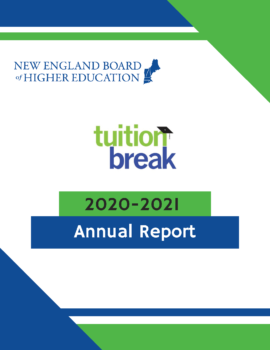
The 2020-21 academic year was a year like no other as a pandemic caused unprecedented disruptions on college campuses. New England colleges and universities responded with agility as they worked to ensure safe campus operations for students, faculty and staff, while continuing to offer their programs through hybrid, in-classroom and remote formats.
COVID-19 had a significant impact throughout the U.S. Enrollment at higher education institutions (HEIs) declined by 2.5% overall, nearly twice the rate of decline reported in fall 2019, according to the National Student Clearinghouse Dec. 2020 report, Current Term Enrollment Estimates, Fall 2020. Freshman enrollment overall decreased an unprecedented 13%. Public colleges and universities saw a 4% decrease from fall 2019 enrollment, and community colleges saw a 10% decrease.
Tuition Break enrollment increased at 40% of institutions
Although the majority of New England public colleges and universities saw overall enrollment decreases in fall 2020, 40% of them saw increases in the number of students eligible through Tuition Break. Total enrollment through Tuition Break increased about 1% at the four-year institutions but decreased nearly 12% at the community colleges.
A total of 9,142 New England residents benefited from NEBHE’s Tuition Break and saved an estimated $63.1 million on their annual tuition bills in 2020-21. A full-time student saved an average of $8,265. Through Tuition Break, New England residents are eligible to pay a tuition rate that is significantly lower than the regular out-of-state rate when they enroll in approved programs offered by out-of-state public colleges and universities within the six-state region.
Meanwhile, the region’s public colleges and universities received an estimated $142 million in tuition and fee revenue from the RSP students enrolled at their campuses in 2020-21.
NEBHE established Tuition Break as the New England Regional Student Program (RSP) in 1957-58 to fulfill the purposes of the congressionally authorized New England Higher Education Compact—expanding educational opportunities for New England residents and sharing higher education resources. To date, the RSP has provided New England residents with discounts on more than 333,000 annual college tuition bills with total savings in the billions of dollars.
More than 2,200 program offerings
The participating colleges and universities allow eligibility for a wide array of degree programs, including specialized programs that are not offered by public HEIs in the students’ home-state. A significant number of Tuition Break programs are in specialized or high-demand career areas, such as bioengineering, cybersecurity, homeland security, justice studies, environmental engineering, allied health, nursing, pharmacy, energy technology, advanced manufacturing technology, sustainability studies, wildlife ecology and zoology.
NEBHE engages the participating institutions in an annual review to approve programs. During the 2020 annual review, institutions approved a total of more than 2,200 programs that will be available to eligible students in 2021-22.
This year’s Tuition Break Annual Report is based on data gathered through NEBHE’s fall 2020 survey of New England public higher education institutions that participate in the RSP. The report provides data by state, institution and program. Highlights of each state’s participation, including lists of popular programs where residents were enrolled are extracted here: Connecticut • Maine • Massachusetts • New Hampshire • Rhode Island • Vermont.
Wendy A. Lindsay is senior director of NEBHE’s Tuition Break (Regional Student Program).
[ssba]
